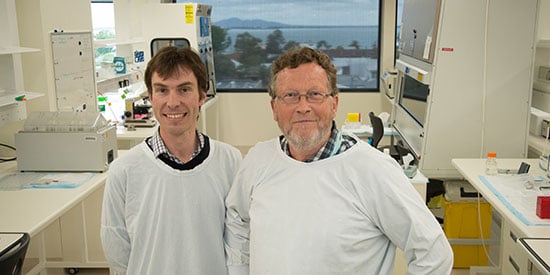New research fellowship to tackle animal to human diseases
Media releaseA new training agreement will help Deakin University and CSIRO look at holistic ways to combat emerging infectious diseases.
The CSIRO-Deakin University One Health Post-Doctoral Fellowship will form part of the Geelong Centre for Emerging Infectious Diseases (GCEID), located at University Hospital Geelong and a partnership that also involves Barwon Health.
The project’s objective is to foster collaboration between CSIRO, Deakin’s Faculty of Health and GCEID more broadly, seeking to improve the health of people, animals, plants, and the environment.
GCEID Director Professor Soren Alexandersen said the One Health Post-Doctoral Fellowship funding would allow Deakin and CSIRO an even greater flexibility and focus for research projects including those requiring a high level of biosecure containment.
Professor Alexandersen said the work would predominantly target viruses of zoonotic concern, diseases that can be transmitted to humans from animals, or vice versa.
"This is important work that will protect our environment, animals and people," he said.
"The end goal is naturally to safeguard and improve human health while focusing on solutions to disease problems, in our case infectious diseases, as early as possible. That means before they may even be a problem in people, while already being present in wildlife, livestock or pets."
Anthony Chamings has been awarded the centre's first three-year post-doctoral research fellowship.
Dr Chamings is a registered veterinarian who recently submitted a PhD thesis on an emerging infectious disease – avian nephritis virus – found in commercial chickens.
He has also supervised research into a number of infectious diseases of commercial, pet and wild birds, and said he was excited to get started.
"This is a great opportunity to get into the One Health space and look at the environment, people and animals as a complete system, not independent from one another but inter-dependent," Dr Chamings said.
"A lot of emerging diseases are coming from people encroaching on environments or wild animals they haven't previously come into contact with, so this is an important subject area.
"One Health looks at that interaction and the bigger picture – a holistic approach that is critical to ensure long-term improvements.
"A lot of viruses are able to jump from one host to another under the right conditions - that’s where SARS, Hendra and most of those emerging diseases that make headlines come from - so we're interested to look at why that happens and what can be done to limit or prevent it."

